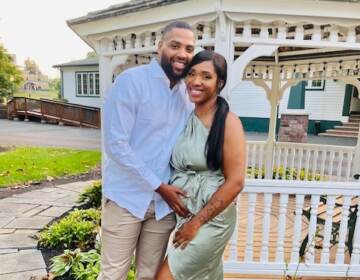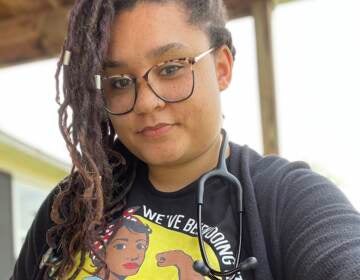One of the few black midwives in Philadelphia wants to give women of color more healthcare options
Black women have higher rates of birth complications at hospitals because doctors often don’t believe their pain.
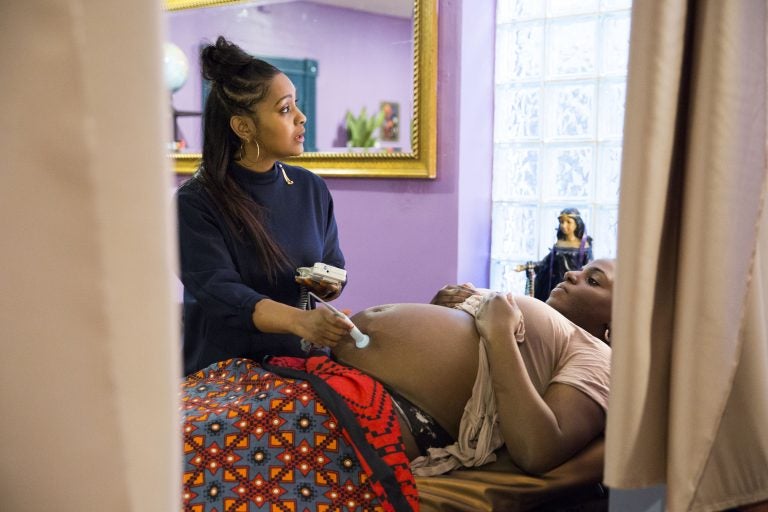
Midwife Asasiya Muhammad (left) listens to the baby's heart tones on client Dana Ndanu on Feb. 9. Ndanu purposefully sought out an African American midwife after feeling disrespected by staff members while delivering her first two children in a hospital. (Rachel Wisniewski for WHYY)
Instead of just focusing on historical figures, for Black History Month, WHYY is telling stories of black people who are breaking barriers in real time. Read the first installment here.
—
When Asasiya Muhammad walks into her office at Inner Circle Midwifery in Germantown, toddlers immediately jump up to greet her.
She picks up a little boy and starts cooing to him.
“I caught him last year,” she said. ‘Catching’ is a term midwives use to explain the process of assisting mothers while giving birth.
Why some minority women choose the non-hospital route
Muhammad is the only black woman that is a certified professional midwife (CPM) in Philadelphia.
She’s also one of the few black women licensed in New Jersey. Pennsylvania does not regulate or license midwives so Philadelphians often go across the bridge to get that certification which holds them to practice standards and allows more access to certain medications. However, certified nurse midwives (CNM) are licensed in every state.
The distinction is that CNMs are registered nurses with a specialization in birthing and midwifery while CPMs are independent midwives who met the standards for certification set by the North American Registry of Midwives (NARM). CPM is the only credential that requires midwives to know and experience out-of-hospital settings.
Muhammad has been at her location since 2016 but has been a practicing midwife since 2013. Before that, she was a doula since 2009. The difference between the two is that a midwife is a professional healthcare provider while the doula is primarily there for emotional support and encouragement.
Muhammad sees being a midwife and unmedicated birthing as an alternative to traditional hospitals. Black women, in particular, have higher rates of birth complications at hospitals. Many black women say they have the experience of their doctors not believing their pain.
Tahira DeVine-Nimmons is a client of Muhammad. She had her daughter, Winter, a few months ago. It was her second pregnancy, but her first unmedicated birth.
“I’ll be honest, [unmedicated birth] hurts more,” DeVine-Nimmons said. “But I was happier. I’d never go back to the hospital.”
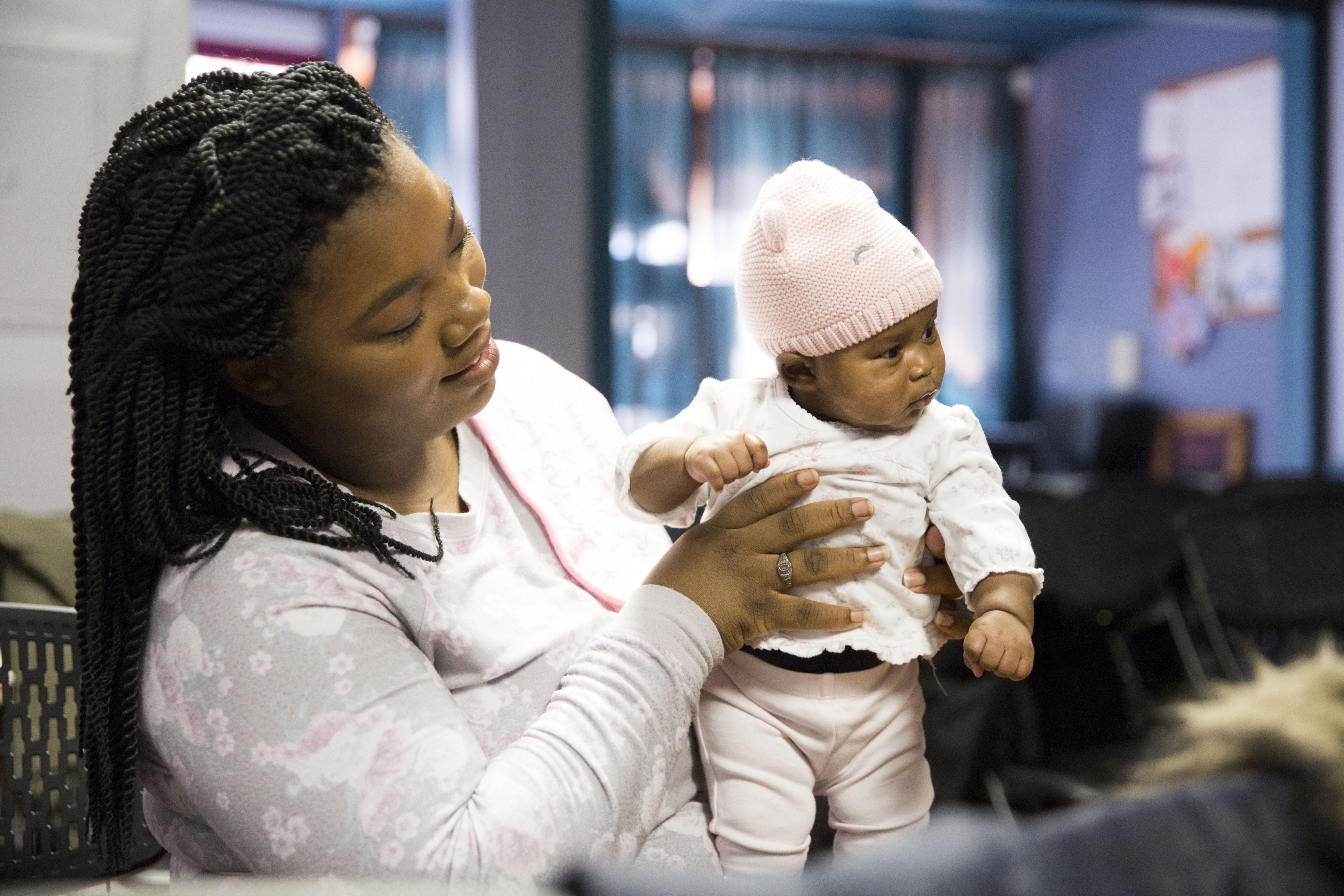
She said her first birth at age 21 was a bad experience. Devine-Nimmons said her doctors weren’t sensitive to her needs and nurses were dismissive toward her young age and race. She remembers distinctly her doctor not letting her leave without giving her a prescription for birth control.
“They only cared about me being 21, black, and unmarried,” she said.
DeVine-Nimmons said it was that incident that led her to look for a black midwife.
Muhammad said she hears similar stories from her clients all the time. Most of the expectant mothers she works with are women of color who have had poor experiences with hospitals in the past.
“The hospital is not malicious,” Muhammad said. “It’s just a system. You’re just a number. Also, a lot of it is a trust issue. All systems, not just healthcare, we have experienced oppression and micro-aggressions. It feels better being with someone who feels like a mom, an aunt, someone you can relate to. Our relationship is ingrained in our care. I’m always a call or text away.”
The goal is to make expectant mothers feel like family.
Dolma Frigeri is not a person of color but is an immigrant from Switzerland. She fell in love with her now-husband online and has since moved to America. She’s pregnant and is expecting to meet her son, named Zebekayah which means ‘God is righteous’, next week.
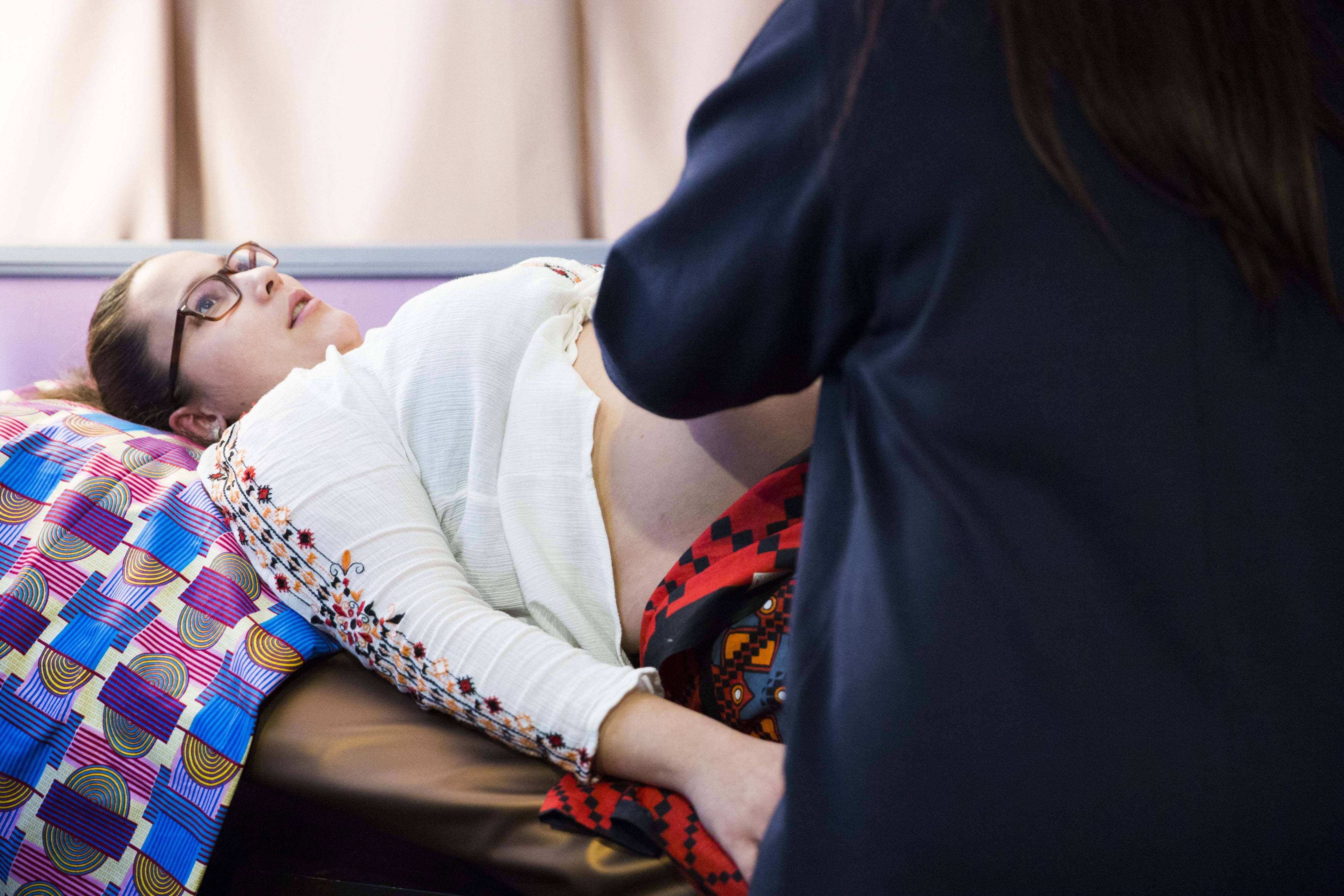
Her doula, Elizabeth Weinstein, arranged to have Frigeri’s family back in Switzerland decorate prayer cards. Weinstein intends on hanging up all the prayer cards at Frigeri’s home so they can encourage her while she gives birth.
Muhammad ensures that all the doulas that work under her give the same amount of care and attention to all her clients. They operate within her ‘doula network’ and she assigns them to expectant mothers.
To make sure all her clients get the proper care and attention, Muhammad will only handle three births per month.
How Muhammad found her calling
The original plan for Muhammad was to be an advocate for any organization that had a mission of uplifting black people and then later to go to law school. She spent most of her young adult life as an activist. However, she was drawn to reproductive justice because of how close it was to her life. She arrived at Temple University at 18, her freshman year, while pregnant. By the time she graduated, she was on baby number two and was married.
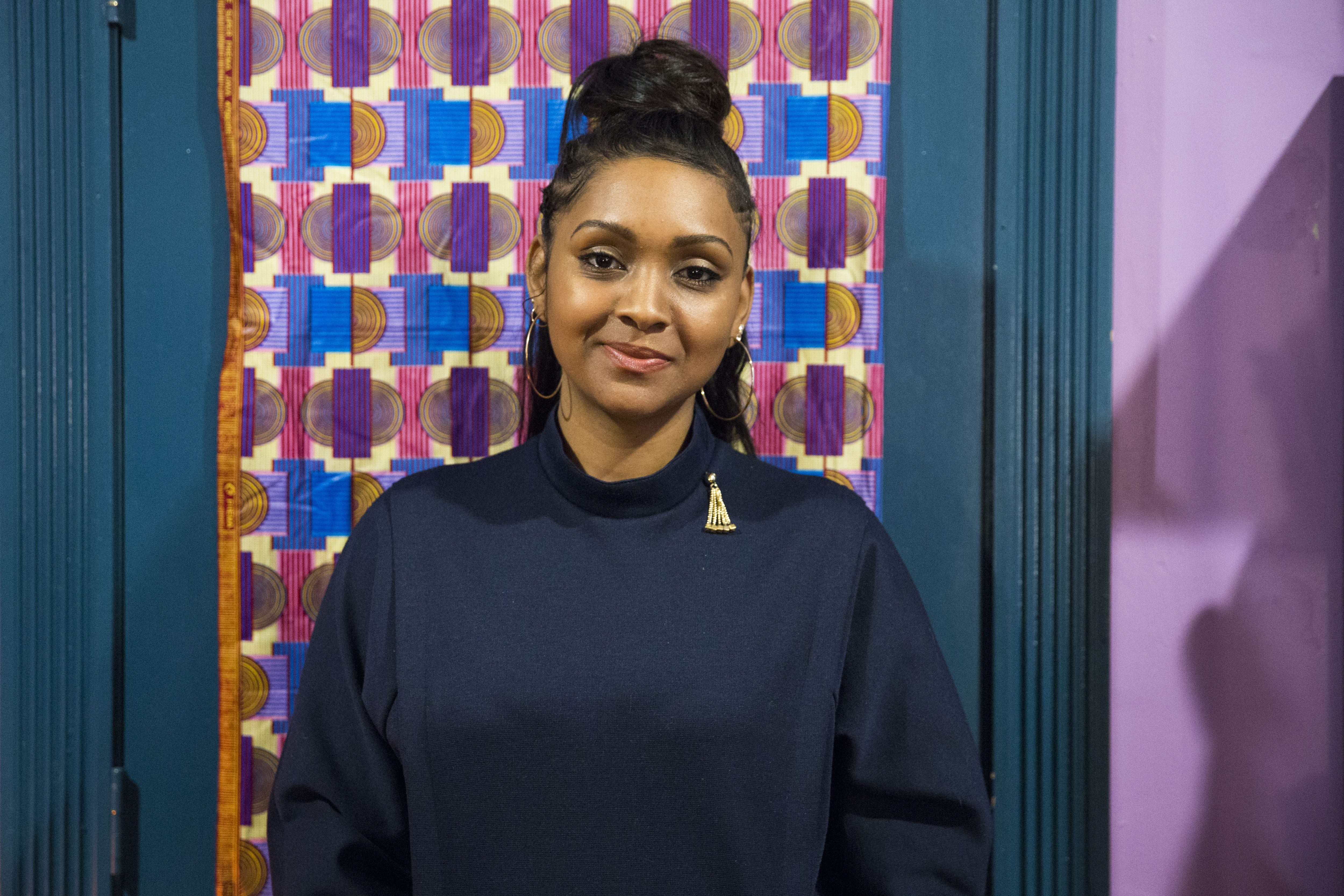
Muhammad has five children in total, so in addition to her professional training, she has personal experience. She’s done both hospital and non-hospital births.
“From 19 to 29, I was either pregnant or breastfeeding,” she said. “It’s the most sacred event. Nothing is a more powerful meeting than the meeting between a child and a mother.”
Muhammad describes the moment she decided to choose to be professionally trained is the moment she chose herself for the first time. Up until that point, she was absorbed in her role of being a mother and a wife.
“The theme of spirituality has always been a part of my life,” she said. “Everything from ages 11 to now, it’s always been about fulfilling a purpose. At the time, it was about being a mom and a wife.”
With the money she raised by applying to scholarships and money she saved herself, she went to El Paso, Texas to be formally trained.
“El Paso was my turning point,” Muhammad said. “El Paso was for me.”
She did exceptionally well. So well, in fact, she was quickly teaching other students and became a leader of the school. She eventually came back to Philadelphia and immediately opened her own practice. She does everything — administers healthcare, business administration and marketing.
The politics
Muhammad’s other focus is training the next generation of minority midwives and doulas.
Amal Sagal, 21, and Hanan Ahmed, 22, are interns for Muhammad. Both already completed their doula training and are students at Swarthmore.
Both were brought on for more administrative work with a particular focus on identifying issues and finding resources for mothers, especially mothers of color, who don’t want to go the traditional route.
Sagal is primarily focused on advocacy. She said she wants every woman to have autonomy of her body and the resources to make that possible.
“There is a base level that is a lack of trust for holistic care,” Sagal said. “Reproductive justice can exist in laws, policies, and public health. It’s at every structural level. It’s looking through a lens of people and individuals, not just seeing people as just a number. I see it as human rights.”
Ahmed, on the other hand, has dreams of eventually becoming a midwife.
“Seeing people who look like you, taking care of you, is so important,” Ahmed said.
Ahmed said she wants to be a midwife because as the oldest of her five siblings, she saw her mother go through all her pregnancies and is accustomed to being in a caring role. She’s only been an intern for a few weeks, and she’s already shadowing and attending home births.
Ahmed said she’s passionate about the work because “healthcare can address structural problems, especially for black and brown women.”
Muhammad wants her business to eventually turn into a lifestyle brand for all things maternal. She wants the unmedicated lifestyle to become cool and trendy, rather than what some people believe to be weird and obscure.
She looks forward to getting merchandise for her business too, because “you should be able to wear your politics the same way [others] push it on us.”
—
Editor’s Note: This story has been updated to reflect more inclusive language in regards to home births.
WHYY is your source for fact-based, in-depth journalism and information. As a nonprofit organization, we rely on financial support from readers like you. Please give today.



